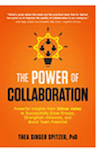How to Create a Collaborative Culture
Much has been written about the ways in which collaboration can benefit the workplace. In a recent Career Builder article, Mary Lorenz discusses the breakthrough approach to collaboration presented by Thea Singer Spitzer, PhD. Thea worked with dozens of business leaders in Silicon Valley to identify the ways they manage to successfully grow groups, strengthen alliances and boost the potential of their teams.

Companies in Silicon Valley earn more patents than any other area. They consistently out-perform other organizations by introducing innovative products and services. It’s no accident that these companies choose their employees very carefully, recruiting employees with the skills necessary to thrive in a culture where collaboration is key. Thea examines this collaborative ethos in her book, The Power of Collaboration. In it, she outlines the approach needed to bring better collaboration to any company, anywhere.
“There are skills every individual can have, can build and can use. These are foundational building blocks for a wonderful collaborative ethos,” she says. If you want to create a more collaborative culture at your company, look for employees who possess the following six skills and characteristics.
1. Have a Drive to Succeed. A common thread among all the successful employees in Silicon Valley is a strong inner drive to achieve success, however that may be defined.
2. Want to Contribute to Something Meaningful. In addition to earning a good living and doing enjoyable work, employees who engage well in a collaborative culture also want to do something helpful to the world.
3. Persistence. Collaborative, curious workers tend to enjoy challenges—viewing opportunities to engage the collective skills of the entire group.

4. Acceptance of Difference. While Silicon Valley still has work to be done in the area of acceptance of diversity, companies there do tend to judge employees based on their knowledge, their skills and their contributions, rather than focusing on nationality, sexual orientation or other traits having nothing to do with job performance.
5. Desire for Genuine Communication. Collaborative organizations prize a culture of trust. “This means conversations where people can express their views honestly, especially when they disagree. It’s about straight talk, and it’s about respectful disagreement about the contents of the issues, rather than personal attacks.”
6. Are Connected to Company-wide Goals. Employees involved in collaborative work tend to see their efforts as part of an overall contribution to the success of the organization.
To read more about how the Executive Forum collaborates with Dr. Spitzer click on Collaborative Culture.
Identify your path to CFO success by taking our CFO Readiness Assessmentᵀᴹ.
Become a Member today and get 30% off on-demand courses and tools!
For the most up to date and relevant accounting, finance, treasury and leadership headlines all in one place subscribe to The Balanced Digest.
Follow us on Linkedin!
